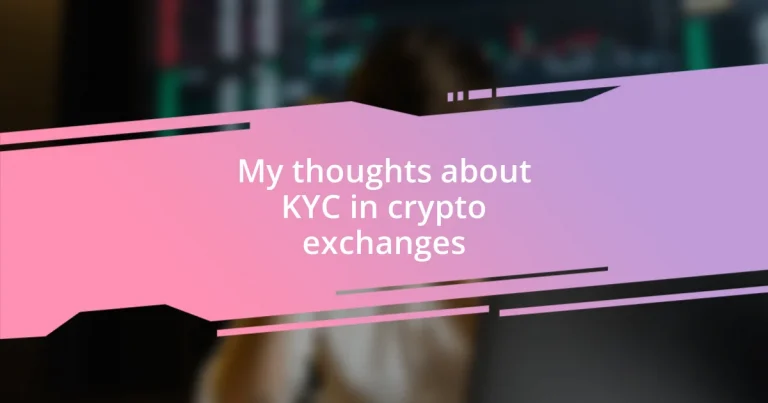Key takeaways:
- KYC (Know Your Customer) processes are essential for fraud prevention, regulatory compliance, and building user trust in the crypto ecosystem.
- Challenges in KYC implementation include regulatory variation, long verification times, and the emotional burden of sharing personal information.
- Future trends in KYC may involve automation for real-time verification, enhanced privacy measures, and community-driven policies to improve user engagement and trust.
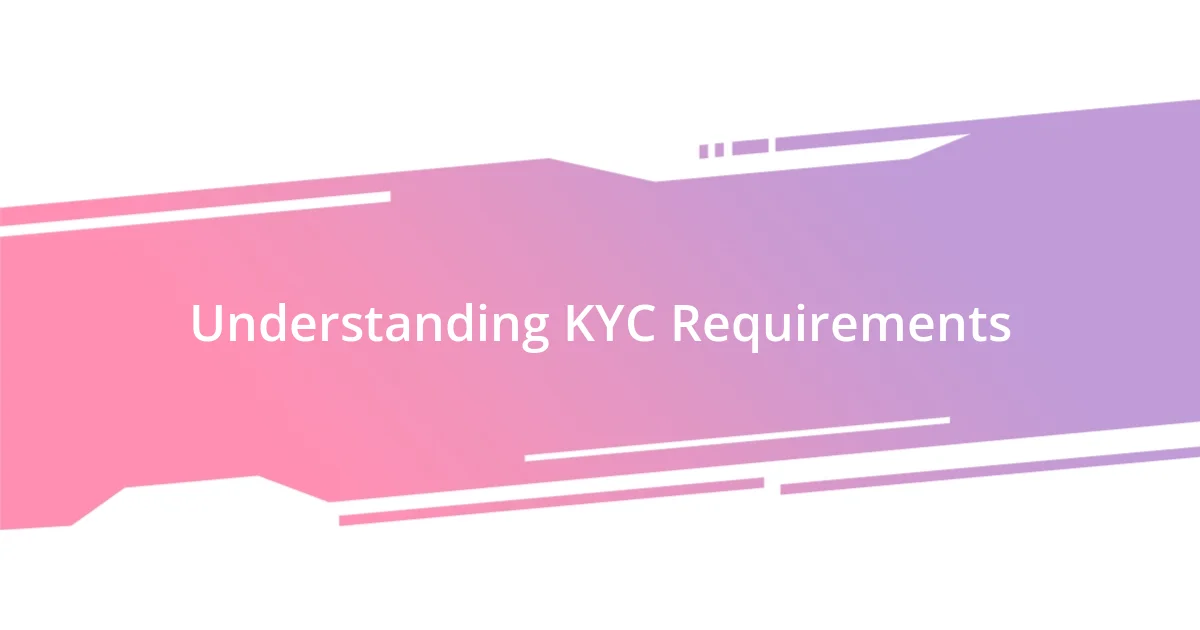
Understanding KYC Requirements
To truly grasp KYC (Know Your Customer) requirements, it’s essential to understand their purpose within the world of crypto exchanges. On a personal level, I recall my own initial hesitation when I first encountered these procedures. I was used to the perceived anonymity of cryptocurrencies, and the thought of sharing personal information felt intrusive. However, I soon learned that KYC is a crucial step in fighting fraud and money laundering, which ultimately protects all users in the ecosystem.
Each crypto exchange has its own KYC process, often requiring users to submit documents like government IDs or utility bills. I remember feeling overwhelmed by the variety of requirements, wondering why it was necessary. Yet, considering the rapid growth of digital currencies, it’s clear that these measures help develop a more secure environment for investors. How else can we ensure the integrity of our transactions if we don’t verify who is on the other side?
As we delve into KYC policies, we also encounter the notion of trust. Trust is foundational in any financial transaction; it is what allows us to engage confidently in the digital space. Reflecting on my own experiences, the more transparent the KYC process, the more comfortable I felt trading on that platform. This leads to an important realization: KYC isn’t merely a regulatory hurdle; it’s a vital safeguard that fosters a secure and trustworthy trading environment for everyone involved.
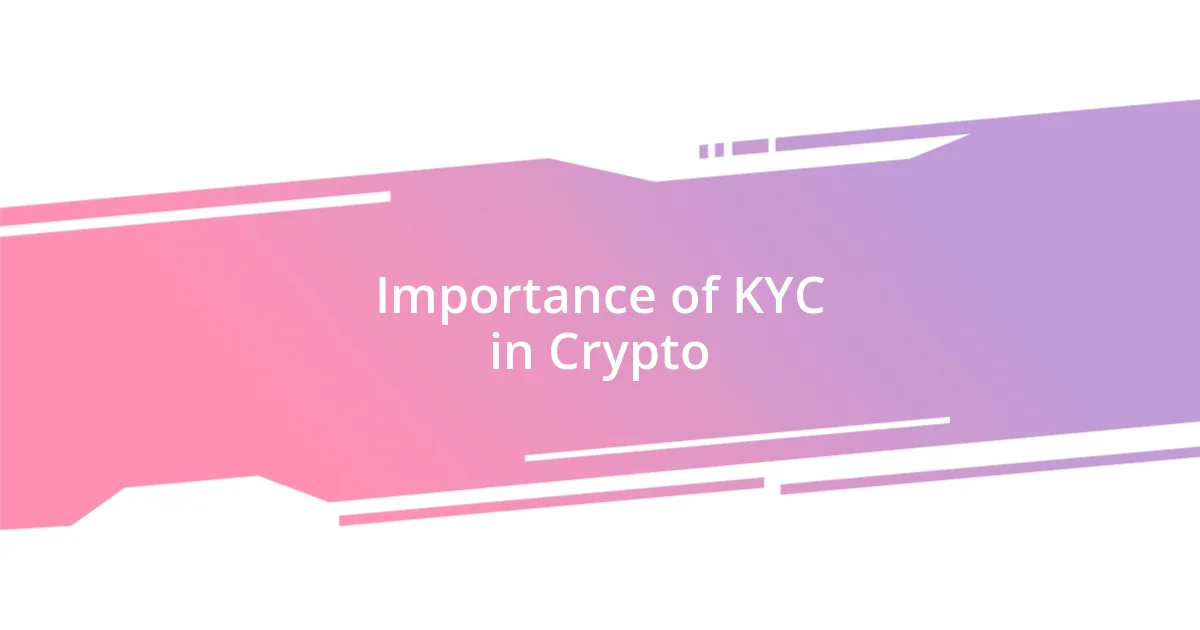
Importance of KYC in Crypto
KYC plays a vital role in establishing trust within the crypto ecosystem, something I didn’t fully appreciate at first. Initially, I just saw KYC as an inconvenience, another set of hoops to jump through. But when I learned about the prevalence of scams and fraudulent activities, I realized that these processes are in place for my protection. The exchange needed to know who I was, and I needed to know that the people I was trading with were legitimate.
Consider some of the key reasons why KYC is essential in crypto:
- Fraud Prevention: It helps to identify and prevent fraudulent activities, creating a safer trading environment.
- Regulatory Compliance: Exchanges comply with governmental regulations that help combat money laundering and terrorism financing.
- User Trust: A robust KYC process fosters a more trustworthy atmosphere, reassuring users about their safety and security online.
- Improved Services: Verified users can access more features and higher withdrawal limits, enhancing their overall trading experience.
When I received confirmation that my identity had been verified, there was a sense of relief that washed over me. It was more than just meeting rules; it was about stepping into a secure zone where I could trade with confidence. The emotional shift from uncertainty to reassurance is significant and, in many ways, showcases the true importance of KYC in crypto exchanges.
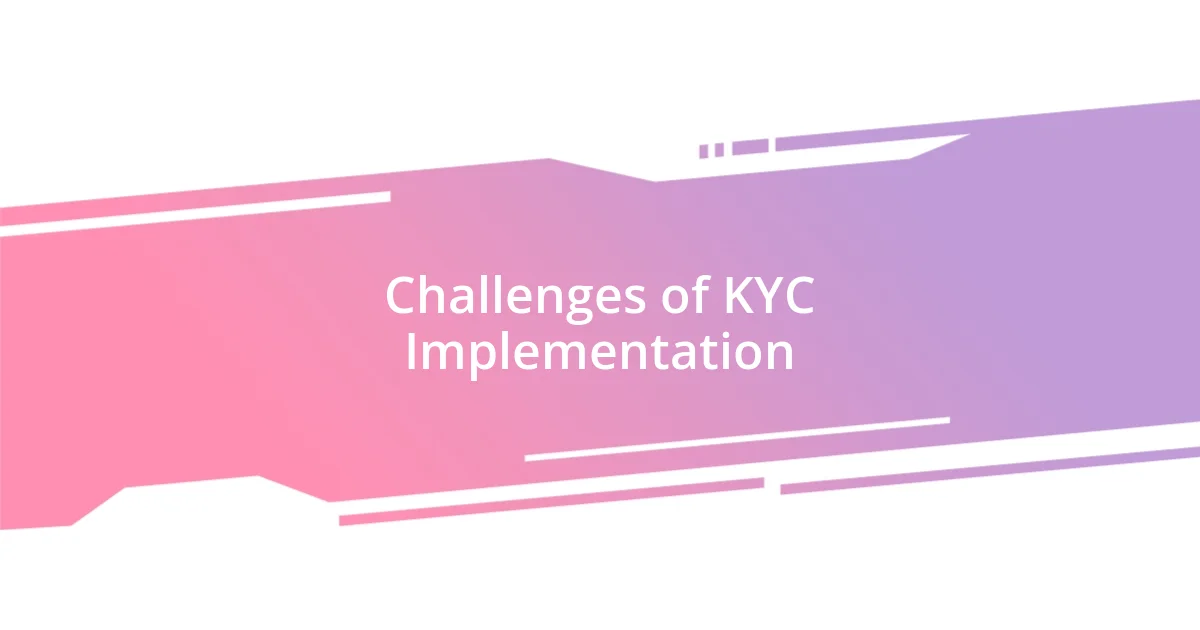
Challenges of KYC Implementation
I’ve found that implementing KYC in crypto exchanges comes with its fair share of challenges. One major hurdle is the varying regulations across different jurisdictions. When I first navigated this world, I was baffled by how diverse the requirements were from one exchange to another. For example, some countries enforce stricter identification standards while others are more lenient. This inconsistency can confuse users and lead to frustrations, especially when they encounter surprises during the verification process.
Another challenge I’ve noticed is the balance between security and user experience. While I completely understand the necessity of KYC measures, there were moments when I felt the process lagged my desire to get trading. The longer verification times can create a barrier to entry for many potential users. I’ve spoken with friends who, after just a few days of waiting, decided to forgo certain exchanges in favor of others, which didn’t require the same rigorous checks. This brings up a key question: how can exchanges streamline this process without sacrificing security?
Lastly, there’s the emotional burden that KYC requirements place on users. Sharing personal information can feel invasive, and I remember feeling a twinge of unease the first time I uploaded my documents. Many users share this concern, which can deter them from engaging with certain platforms. It’s clear that finding ways to protect privacy while still complying with regulatory demands is a complex but crucial challenge for crypto exchanges looking to foster trust without alienating their user base.
| Challenge | Description |
|---|---|
| Regulatory Variation | Inconsistent KYC requirements across different jurisdictions can confuse users. |
| User Experience | Long verification times may deter potential users from completing the process. |
| Emotional Impact | Sharing personal information can create anxiety and distrust among users. |
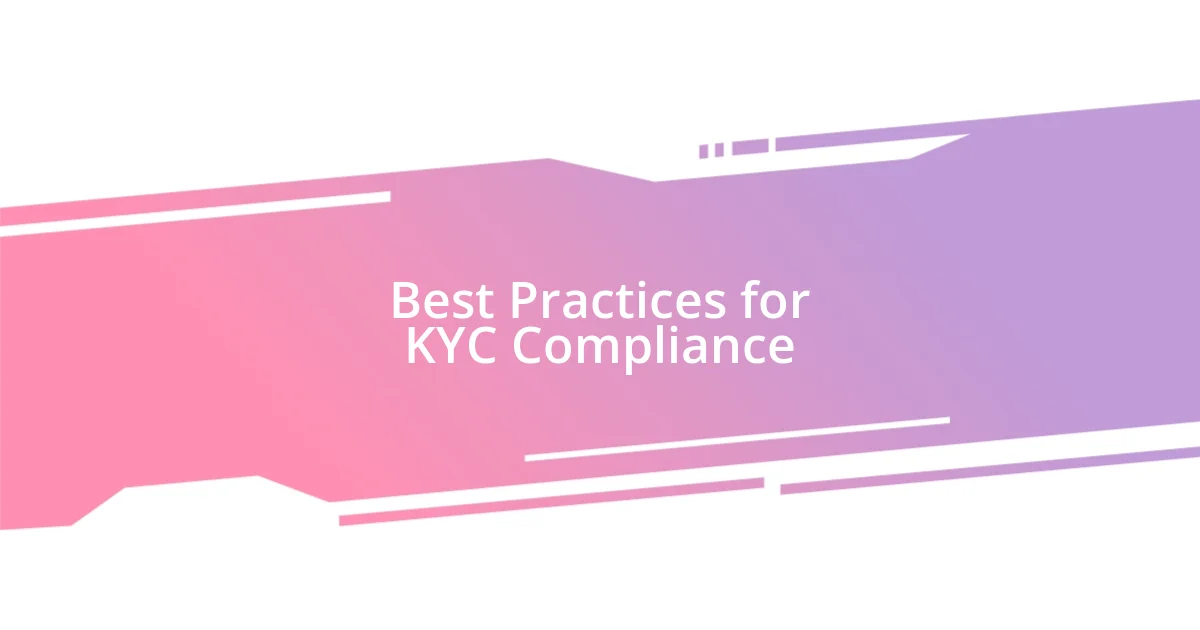
Best Practices for KYC Compliance
When it comes to best practices for KYC compliance, I’ve discovered that having a clear and user-friendly verification process is paramount. I remember the relief I felt when my chosen exchange provided a straightforward step-by-step guide through the KYC requirements. This not only made the process less overwhelming, but it also helped set expectations, which is key for user satisfaction. Have you ever faced confusion during KYC? I certainly have, and it wasn’t a pleasant experience.
Another crucial aspect is the technology used for identity verification. I believe that enhancing security through modern solutions, like biometric verification or AI-driven document checks, not only speeds up the process but can also reduce user anxiety. Personally, when I saw an exchange using facial recognition technology, it gave me a sense of reassurance that my data was protected with cutting-edge methods, making me more inclined to trust the platform.
Finally, ongoing communication plays a vital role in building trust. Just last month, I received an email update from an exchange on the status of my KYC verification, and it truly made a difference in how I felt about the process. Keeping users informed and engaged encourages a sense of partnership, transforming what could feel like a tedious obligation into a collaborative effort. Isn’t it refreshing to know you’re valued as a user? This transparency not only reinforces compliance but paves the way for a more trusting relationship between users and exchanges.
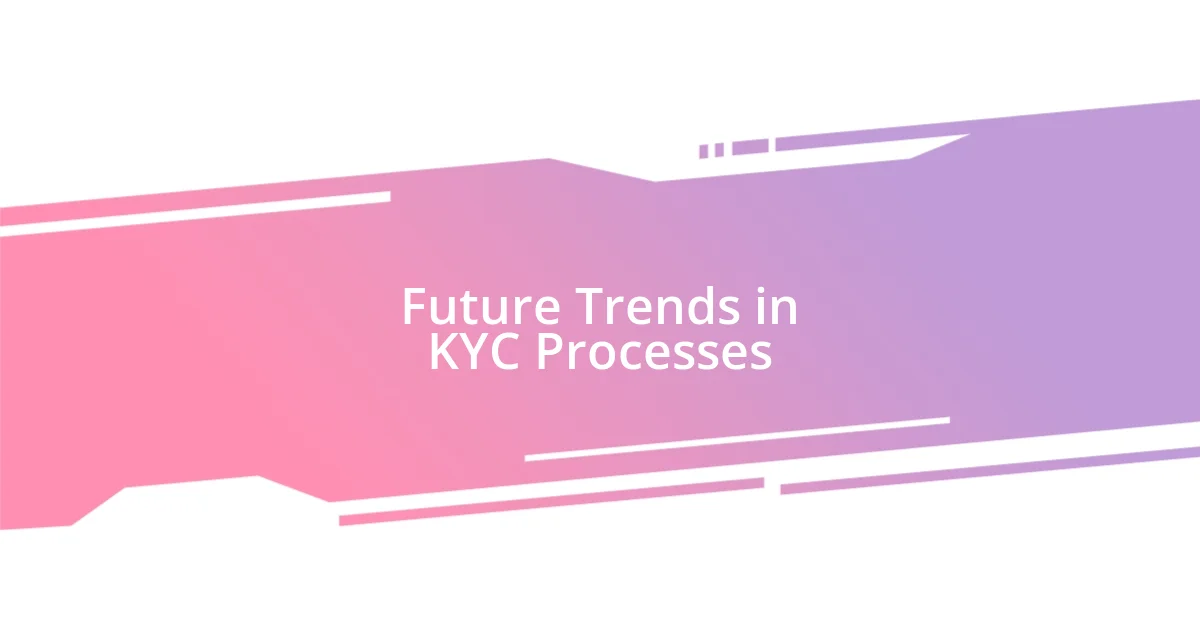
Future Trends in KYC Processes
As I gaze into the future of KYC processes in crypto exchanges, I can’t help but think about the role of automation. Imagine a world where real-time identity verification becomes the norm, reducing the waiting period significantly. I remember the frustration of waiting days for approval. If exchanges could adopt instant AI verification systems, it might not only streamline the process but also elevate user satisfaction immensely.
Another trend I foresee is the integration of more user-centric privacy measures. With growing concerns about data security, it’s vital that exchanges respect users’ emotional boundaries. The idea of holding personal data may terrify some, and I understand that fear deeply. If exchanges could implement decentralized identity solutions, perhaps we would feel more empowered and less vulnerable, enabling a more open and trusting environment.
Lastly, I believe community-driven KYC policies will start to emerge. Platforms that allow user feedback on KYC processes could foster a sense of belonging and empowerment. I often think about how collaborative efforts can drive change. Have you ever wished you could share your experience to influence a platform’s approach? Engaging communities this way can not only lead to more tailored processes but also create a shared ownership of safety and compliance in the crypto space.
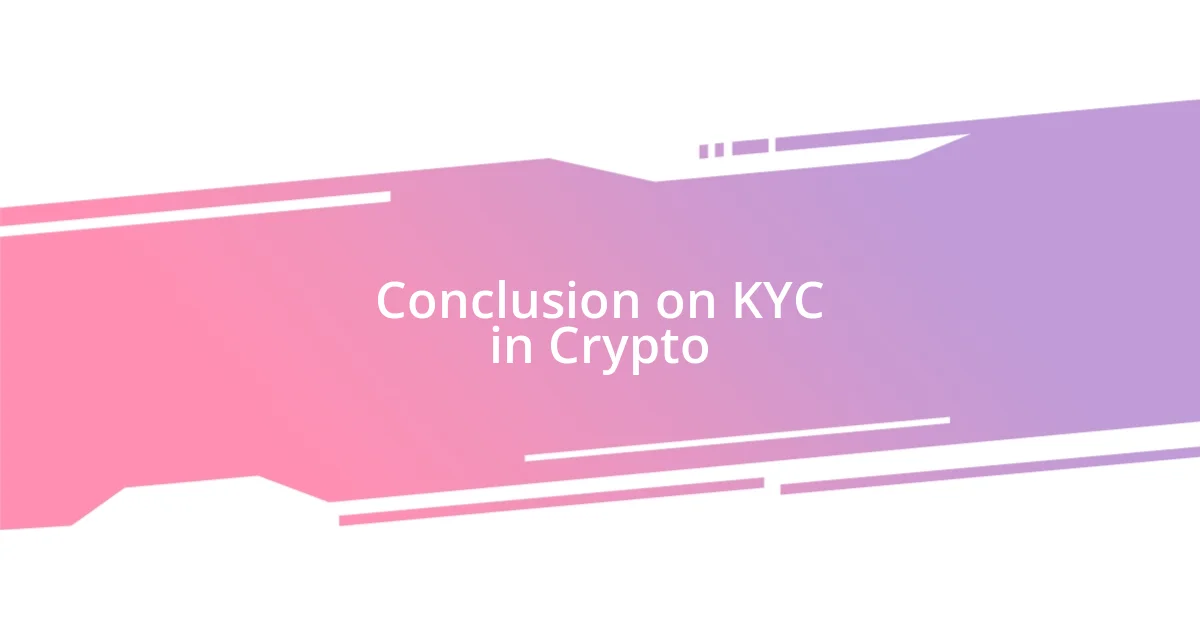
Conclusion on KYC in Crypto
KYC in crypto exchanges undeniably presents a complex balance between security and user experience. Reflecting on my experiences, I’ve often felt torn between the need for regulation and the desire for privacy. It’s fascinating how compliance can feel like a shield against fraud, yet at times, it has also felt cumbersome and intrusive. How do we reconcile that? I believe finding that middle ground is essential for the future.
Moreover, I’ve noticed that the approach to KYC varies significantly across platforms. At one exchange, I was greeted by a welcoming and supportive staff, making the verification seem like a friendly chat rather than an obstacle. On the contrary, another platform left me feeling like just another faceless user in a bureaucratic machine. It’s these personal touches that can make a world of difference and truly enhance user trust. Have you ever experienced a KYC process that felt personal? Those moments can redefine how we engage with the entire crypto space.
Ultimately, I see KYC as a necessary evolution in the crypto world. While it may seem like a hurdle at times, it’s a step toward greater legitimacy and protection within this exciting landscape. As we continue to share our experiences and hold exchanges accountable for their practices, I remain optimistic that KYC processes can evolve to serve us better. Doesn’t that make you hopeful about the future of crypto?












